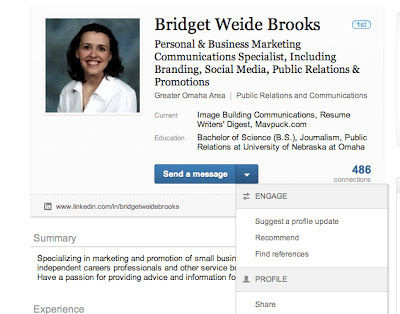You must either be connected to the individual you wish to Recommend or know his or her email address. Also, the individual must have a valid LinkedIn account. You may find it easiest to use the "select from your connections list" in the "Make a Recommendation" section.
You can also make a Recommendation from the individual's profile page directly:
(Note: In the Pass-Along Materials, the screen shots are of a fictionalized profile. You can also replace the screen shots with your own profile, like I did above with my own LinkedIn profile)
Some things to consider before writing a Recommendation are:
- What are they good at?
- What did they do better than anyone else?
- What impact did they have on me? (How did they make my life better/easier?)
- What surprised you about the individual?
Within the Recommendation, you want to include four things (this is an excerpt of the full "Formula for a LinkedIn Profile"):
- How you know the person
- Why you recommend them
- A story that backs up your Recommendation (providing "social proof")
- A call to action
Your finished Recommendation might look like this (this is an example of the type of notification email you'll receive when someone Recommends you):
Resume writers -- learn more about the "How to Give -- and Get -- LinkedIn Recommendations" Pass-Along Materials package. It's brandable content you can use in your own resume writing business.
Here's what you can do with this content (you can edit the report or use it "as is"):
- Use it as a free giveaway to build your prospect mailing list or sell it.
- Tweet excerpts or post updates to Facebook and/or LinkedIn using the tips in the content.
- Break it into sections and use it as a series of blog posts or articles on your website.
- Turn it into a video and use it to drive traffic to your website.
- Use it as a a script or an outline for a webinar.
- Make it a handout for a LinkedIn training class.
- Add it as a bonus for a LinkedIn membership program or training.
Because it's provided in Microsoft Word format, you can change out the screen shots to feature your own profile, and you can add to -- or edit -- any of the content.
If you are a Bronze member of BeAResumeWriter.com (just $10/month), you can access this content in the Paid Member Resources section from now until Oct. 9, 2012. Or, you can purchase the package at this link: How to Give -- and Get -- LinkedIn Recommendations.







